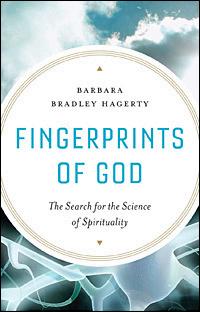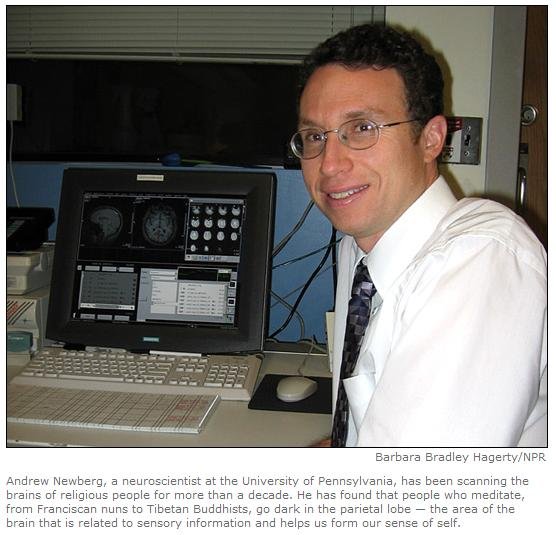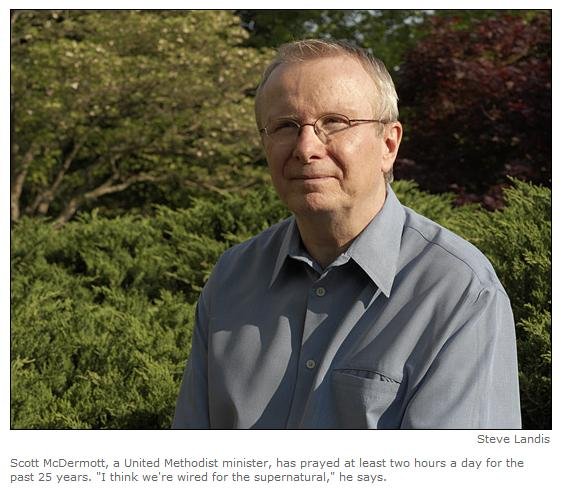 Scientists are making the first attempts to understand spiritual experience — and what happens in the brains and bodies of people who believe they connect with the divine.
Scientists are making the first attempts to understand spiritual experience — and what happens in the brains and bodies of people who believe they connect with the divine.
The field is called "neurotheology," and although it is new, it's drawing prominent researchers in the U.S. and Canada. Scientists have found that the brains of people who spend untold hours in prayer and meditation are different.
I met Scott McDermott five years ago, while covering a Pentecostal revival meeting in Toronto. It was pandemonium. People were speaking in tongues and barking like dogs. I thought, "What is a United Methodist minister, with a Ph.D. in New Testament theology, doing here?"
Then McDermott told me about a vision he had had years earlier.
"I saw fire dancing on my eyelids," he recalled, staring into the middle distance. "I felt God say to me, 'You be the oil, and I'll be the flame.' Then [I] began to feel waves of the Spirit flow through my body."
I never forgot McDermott. When I heard that scientists were studying the brains of people who spent countless hours in prayer and meditation, I thought, "I've got to see what's going on in Scott McDermott's head."
Focusing Affects Reality
 A few years later, Andrew Newberg made that possible. Newberg is a neuroscientist at the University of Pennsylvania and author of several books, including How God Changes Your Brain. He has been scanning the brains of religious people like McDermott for more than a decade.
A few years later, Andrew Newberg made that possible. Newberg is a neuroscientist at the University of Pennsylvania and author of several books, including How God Changes Your Brain. He has been scanning the brains of religious people like McDermott for more than a decade.
On
a spring day in Newberg's laboratory, the neuroscientist settles
McDermott in a darkened examination room and asks the pastor to pray
for someone else — that is, intercessory prayer.
A few minutes later,
at the moment Newberg believes McDermott has reached the peak of his
prayer, the researcher injects the minister with a dye that shows the
blood flow in his brain.
Twenty minutes later, McDermott emerges beaming. He has enjoyed intense spiritual moments like this ever since he was in his 20s.
"The first thing that got me was I could hear God's voice," the pastor said. "And it so enamored me — I mean, it changed me dramatically. I couldn't wait to pray!"
McDermott has prayed at least two hours a day for the past 25 years.
I ask Newberg what kind of impact that would that have on the pastor's brain.
"The more you focus on something — whether that's math or auto racing or football or God — the more that becomes your reality, the more it becomes written into the neural connections of your brain," Newberg says.
'I Think We're Wired For The Supernatural'
 Now
it's time for Newberg to take a peek at McDermott's neural connections,
sliding him into a SPECT scanner, which will create an image of which
parts of McDermott's brain lit up and which went dark while he prayed.
Now
it's time for Newberg to take a peek at McDermott's neural connections,
sliding him into a SPECT scanner, which will create an image of which
parts of McDermott's brain lit up and which went dark while he prayed.
A few minutes later, Newberg has preliminary results on his computer screen. He notes some areas of increased activity in the frontal lobes, which handle focused attention — precisely what Newberg would expect from a person praying intently. But he adds that this needs further analysis — and he'll need to find more volunteers to do this kind of interpersonal prayer before he can come to any conclusions.
Afterward, I ask McDermott if any of this challenges his beliefs. Not at all, he says.
"I think we're wired for the supernatural," he says. "I think we're meant to sense a world beyond our five senses. Come on! Taste and see that God really is good."
Newberg says he can't prove that McDermott or anyone else is communing with God, but he can look for circumstantial evidence.
"What we need to do is study those moments where people feel that they're getting beyond their brain, and understanding what's happening in the brain from a scientific perspective, what's happening in the brain from their spiritual perspective," he says.
Then he'll compare the mystical feelings with the brain physiology.
A Sense Of Oneness With The Universe
Newberg did that with Michael Baime. Baime is a doctor at the University of Pennsylvania and a Tibetan Buddhist who has meditated at least an hour a day for the past 40 years. During a peak meditative experience, Baime says, he feels oneness with the universe, and time slips away.
"It's as if the present moment expands to fill all of eternity," he explains, "that there has never been anything but this eternal now."
When Baime meditated in Newberg's brain scanner, his brain mirrored those feelings. As expected, his frontal lobes lit up on the screen: Meditation is sheer concentration, after all. But what fascinated Newberg was that Baime's parietal lobes went dark.
"This is an area that normally takes our sensory information, tries to create for us a sense of ourselves and orient that self in the world," he explains. "When people lose their sense of self, feel a sense of oneness, a blurring of the boundary between self and other, we have found decreases in activity in that area."
Newberg found that result not only with Baime, but also with other monks he scanned. It was the same when he imaged the brains of Franciscan nuns praying and Sikhs chanting. They all felt the same oneness with the universe. When it comes to the brain, Newberg says, spiritual experience is spiritual experience.
"There is no Christian, there is no Jewish, there is no Muslim, it's just all one," Newberg says.
A little theological dynamite there — but, remember, the research is just beginning.
'You Can Sculpt Your Brain'
So far, scientists have focused on people who pray or meditate for one, two or more hours a day. They think that studying spiritual virtuosos will offer clues to the brain workings of more typical believers. But now Newberg and others are turning their attention to people who want to enrich their spiritual lives, but don't have that kind of time.
And there's hope for people with jobs and kids.
Neuroscientist Richard Davidson says you can change your brain with experience and training.
"You can sculpt your brain just as you'd sculpt your muscles if you went to the gym," he says. "Our brains are continuously being sculpted, whether you like it or not, wittingly or unwittingly."
It's called neuroplasticity. For years Davidson, who is at the University of Wisconsin, has scanned the brains of Buddhist monks who have logged years of meditation. When it comes to things like attention and compassion, their brains are as finely tuned as a late-model Porsche. Davidson wondered: Could ordinary people achieve the same kind of connection with the spiritual that the monks do — without so much effort?
I wondered that, too. And when I heard his lab was launching a study lasting two weeks, I said, "Sign me up."
It turned out I was too old for the study. But they let me see what it was about. For 30 minutes every morning, I settled into my chair to the soothing tones of a meditation CD. The voice of a University of Wisconsin graduate student urged me to shower compassion on a loved one, a stranger, myself.
The trouble came when I was asked to visualize someone I had difficulty with in life. I became surly, as I reflected on the minor tragedies in my life and the people who caused them. When I saw Richard Davidson, I didn't mention how ill-tempered I had grown.
"Is there a capacity to change my brain if I continue with this?" I asked.
"Absolutely," he responded enthusiastically. "I would say the likelihood is that you are already changing your brain."
I hope not. Others, however, were far more successful in cultivating a spiritual mind-set. Davidson couldn't tell me about the results of my study, which have yet to be published. But he could say there were detectable changes in the subjects' brains within two weeks. Another similar study, where employees at a high-tech firm meditated a few minutes a day over a few weeks, produced more dramatic results.
"Just two months' practice among rank amateurs led to a systematic change in both the brain as well as the immune system in more positive directions," he said.
For example, they developed more antibodies to a flu virus than did their colleagues who did not meditate.
One mystery about spiritually inclined people is this: What turns people into spiritual virtuosos? I have come to think that people like Scott McDermott are to prayer what Tiger Woods is to golf. From an early age, their natural talents channeled them toward golf, or toward God, and once they felt the rush of watching that ball fall into the hole or sipping the unearthly wine of transcendence, they pursued their passions. They trained because the reward was so sweet and so constant. Nature and nurture, genes and sweat, schemed to create these masters.
Scott was sixteen when he says he first "encountered" God directly. From that time on, prayer became the central habit of his life, around which all other events orbited. Scott has prayed one to two hours a day for more than thirty-five years. On Fridays, his day off, he is often on his knees for four. During those sessions, Scott feels peace and joy. He says he often hears a voice and receives visions.
"I begin early," he told me. "I begin at five-thirty. I'm not a morning person. I stumble down to my basement. My study's down in my basement. I have a recliner down there. I walk down, turn the lights on, and say, 'God, it's just me. I just want to spend some time with you.' And I sit in that chair and we begin to have a conversation."
I turned to Andy Newberg, who was standing with us in a small examination room at the hospital. Newberg was listening intently.
"I'm curious, Andy, what would that kind of practice do to the brain?" I asked.
"Well, some of the research we have been doing suggests that when people are engaged in practices over a long period of time, it does ultimately alter how the person's brain functions," Newberg responded. "As one does a particular practice or a particular task over and over, that becomes more and more written into the neural connections of the brain. So the more you focus on something, whether it's math or auto racing or football or God, the more that becomes your reality."
I glanced at Scott to see if he picked up the ambivalence in Newberg's response: God may be "your reality" and still be imaginary. The belief in God may shape your worldview, and your brain, in the same way Harry Potter books shape the brains and imaginations of children. But no one would argue that a wizard like Harry Potter actually exists.
I put the question to Newberg more explicitly: "When people pray, do they connect to God or tap into a dimension outside of their bodies?"
Newberg was prepared with a careful answer.
"Well, it comes down to belief systems," he said. "When a religious person looks at our brain scans, they say, 'Ah, that's where God has an interaction with me.' An atheist looks at the data and says, 'There it is. It's nothing more than what's in your brain.' Even if I do a brain scan of somebody who tells me that they've seen God, that scan only tells me what their brain was doing when they had that experience, and it doesn't tell me whether or not they actually did see God."
In fact, Newberg is undecided as to whether brain images reveal there is a God or not. Materialists would say that brain scans prove that prayer is a physical process, nothing more; there is no need to bring an external being into the equation. But Newberg points out that brain scans do not necessarily exclude an external being. Say you are eating a piece of apple pie, just out of the oven, topped with melting vanilla ice cream. If Newberg took a brain scan of you as you bit into the pie, various parts of your brain would light up—the areas that register smell, taste, form, and shape, as would the area that recalls the memory of the time you tasted pie this good, at the county fair when you were six years old. The parts of the brain not involved with the task would go dark. Who knows? You may even lose a sense of self in this ecstatic culinary moment. But just because your brain is activated in a certain way, does that mean the apple pie isn't real? Of course it's real. And just because Scott McDermott's prayers correlate to brain activity, does that mean God is mere illusion?
Courtesy of Riverhead Books, a division of Penguin Group (USA)
